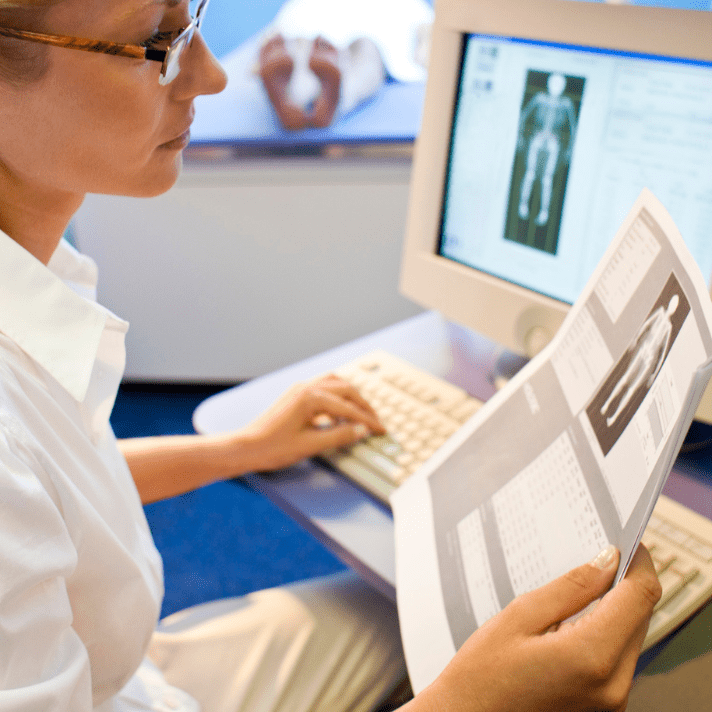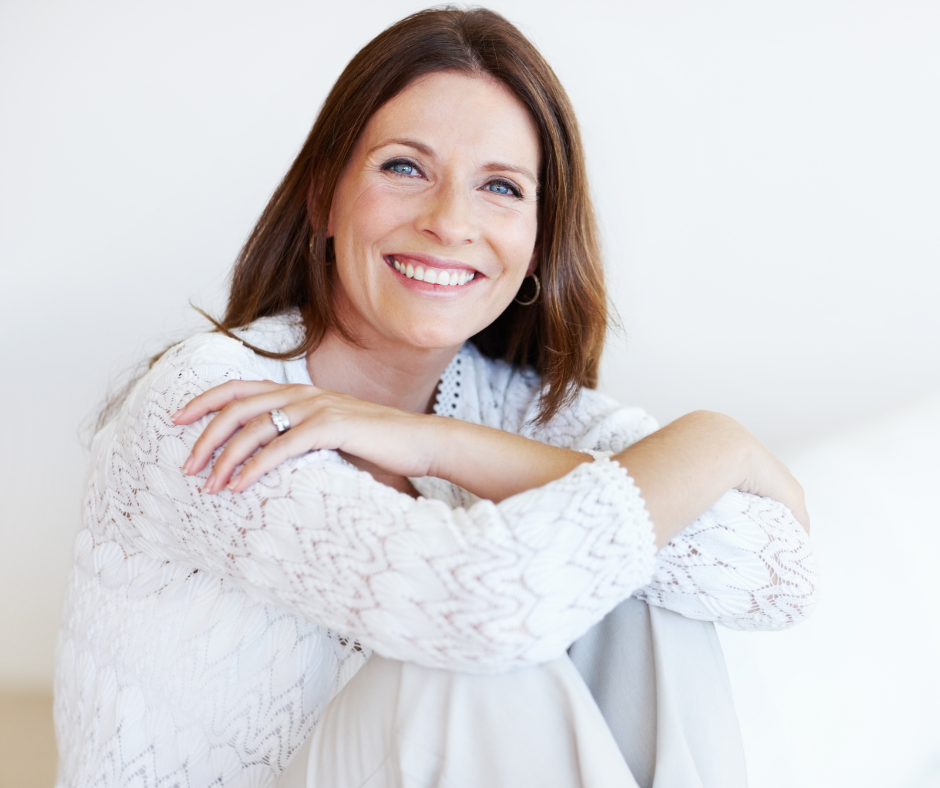
How to Keep Your Skeleton Strong
We’ve been programmed to think of osteoporosis as something to worry about “later” when we reach older adulthood. The US Department of Health and Human Services doesn’t recommend bone density screening until age 65. If you’re under 64 and have gone through menopause (which is bizarre wording on their part… I’d venture to say if you’re 64, you’ve gone through menopause), they say, “Ask your doctor” if you need screening.
I did just that. I have been in menopause for three years and got my annual physical in 2022. My blood test revealed low calcium and vitamin D (odd because I have been taking 10,000 IUs with vitamin K) and elevated cholesterol. My doctor recommended calcium and told me that a bone density test (DEXA) is done after 60, with risk factors like smoking, early menopause, long-term steroid use, and history of osteoporosis. Since I am 52, I did not qualify. One month later, I fell and fractured my foot, I asked again, and my request for the test was approved.

Osteoporosis is a disease that causes bones to become brittle and weak. It’s common in older women, but bone health is important throughout your life. If you want strong bones in the future, you need to start taking care of them by maintaining a healthy weight, eating right, staying active, and avoiding certain medications. In addition, some people may need medical treatment for osteoporosis or osteopenia. So I did some research, and this is what I found out:
In your reproductive years, you can reduce your risk of osteoporosis by doing the following:
Reverse osteoporosis risk factors in your reproductive years. In your reproductive years, you can reduce your risk of osteoporosis by doing the following:
- Get enough calcium and vitamin D through diet or supplements. Not getting enough calcium and vitamin D puts you at greater risk of fractures later in life. Some studies have shown that women with higher intakes of these nutrients have a lower risk for fracture than those with lower intakes.
- Exercise 30 minutes most days of the week. Regular exercise helps keep bones strong and healthy throughout life and increases muscle strength and balance, reducing injury risks due to falls.
- Quit smoking or limit how much you smoke if you smoke regularly (one day or more). Cigarette smoking has been linked to an increased chance of falls that result in broken bones or fractures, especially among older adults with osteoporosis who also take hormone replacement therapy medications called bisphosphonates (for example, Fosamax®). Quitting smoking is also important because it often reverses some damage caused by smoking, such as loss of lung function and increased heart rate. If possible, ask your doctor about switching from one type of medication designed specifically for treating conditions like arthritis pain relief purposes instead since these drugs tend not only to provide better symptom relief but also won’t interfere negatively.

Get enough calcium and vitamin D through diet or supplements.
Calcium is critical for healthy bones, and your diet is the best way to get enough calcium. Good sources of calcium include:
- Dairy products (milk, cheese).
- Dark green leafy vegetables (collard greens, kale).
- Sardines.
- Salmon and tofu.
Calcium alone will not build strong bones; you also need vitamin D. Vitamin D helps your body absorb calcium effectively so that it may be deposited into your bones where it’s needed most. If you don’t have enough vitamin D in your system, then you can’t use all of the calcium in your diet efficiently. In other words, if you want stronger bones at any age, get more sun! I usually like to go early in the morning, before 10 am or after 3 pm, when the rays are not as intense for 15 minutes.
Exercise for 30 minutes most days of the week.
As you age, physical activity can help protect your bones and muscles. To do so, include aerobic exercise in your routine for at least 30 minutes most days of the week. This exercise helps increase bone density by making new cells to replace damaged ones and increasing blood flow to the bones. Aerobic exercise also increases muscle strength, balance, and coordination, which can reduce falls and help you maintain a healthy weight.
Quit smoking.
If you’re a smoker, quitting for good can help prevent osteoporosis and other bone diseases. Smoking reduces the density of bones in both men and women. Unfortunately, it also increases your risk of osteoporosis, which causes fractures from weak bones.
The increase in bone density is most significant among young people who quit smoking after smoking for a long time. The benefits continue to grow with time since quitting smoking.
Women who smoke are at higher risk than nonsmokers of hip fractures, including those in the spine or wrist.
Avoid excess alcohol. How much alcohol is too much?
Once you reach menopause and beyond, it’s important to avoid excess alcohol. “Any alcohol can affect your bones,” says Louisa Chew, MD, MPH. Excessive drinking can increase the risk of falls and fractures in older women at a higher risk of osteoporosis due to age or other medical conditions like diabetes. It can also cause liver and heart disease, which stresses the musculoskeletal system.

What types of drinks should I avoid?
When drinking alcoholic beverages during meals or social functions (or any time), stick with red wine because it contains resveratrol. This polyphenol may help prevent bone loss by increasing bone density. On the other hand, beer contains sulfates that interfere with calcium absorption; vodka has no nutritional value; whiskey contains no nutrients; gin doesn’t provide any trace minerals; tequila does contain some vitamin C but not enough for optimal health benefits. So red wine, in balance, is the drink of choice!
If you’re taking an anti-inflammatory drug to treat a chronic condition, ask your doctor if you can switch to another kind of medication.
If you’re taking an anti-inflammatory drug to treat a chronic condition, ask your doctor if you can switch to another kind of medication.
For example, non-steroidal anti-inflammatory drugs (NSAIDs) such as ibuprofen can increase bone loss and the risk of fractures. If your doctor prescribes NSAIDs for an extended period, talk about other options, like taking supplements or switching to corticosteroids.
If you’re taking medication for an overactive thyroid, ask your doctor about adjusting your dosage, so it’s not too high.
If you’re taking medication for an overactive thyroid, ask your doctor about adjusting your dosage, so it’s not too high. The most common medications used to treat hyperthyroidism are levothyroxine (Levothroid, Synthroid) and liothyronine (Cytomel).
If you find that changing your medication doesn’t do the trick, ask your doctor if there are alternatives that might be better for you. One alternative is Tapazole, which is less likely than other medications to cause bone loss. However, if tapazole doesn’t work for you or if it causes side effects like jitters or nausea, talk with your doctor about other options.
As part of menopause, your estrogen levels drop, which increases your risk of osteoporosis because estrogen helps build and maintain bone strength. To prevent bone loss at menopause, do the following:
- Exercise regularly. Exercising three to five times a week will help you build strong bones and muscles. Choose activities that challenge your body and make you break a sweat for about 30 minutes at a time. Some exercises include walking, swimming, jogging, jumping rope, and weightlifting.
- Eat a healthy diet with calcium-rich foods like dairy products, leafy green vegetables (collard greens), sesame seeds, and almonds. If you don’t eat dairy products or have trouble digesting lactose (a sugar found in milk), talk to your doctor about other sources of calcium or supplements that may be right for you. You should also seek out vitamin D if you cannot get enough sunlight on your skin during the day (about 20 minutes of unprotected sun exposure each day) since this nutrient helps your body absorb calcium better than it can.
Before starting hormone therapy, have a bone density test to diagnose osteoporosis or osteopenia (a precursor to osteoporosis).
Bone density testing is vital for diagnosing osteoporosis or osteopenia and determining your risk of fractures. A T-score below -1 can mean you have a low bone density.
Discuss with your doctor whether hormone therapy is right for you.
Hormone therapy is not for everyone. It can cause side effects such as hot flashes, vaginal dryness and irritation, breast tenderness and enlargement, headaches, and joint pain. Hormone therapy also increases the risk of blood clots in the legs (deep vein thrombosis) or lungs (pulmonary embolism).
Some studies have shown that women who used postmenopausal hormone therapy had a slightly higher risk of getting breast cancer than women who did not use this type of treatment. In addition, women who have had their uterus removed are at higher risk for endometrial cancer even when they use hormone therapy; they should talk with their doctor about whether they need to take progestin to protect against this cancer.
This treatment can also increase your chances of stroke or dementia if you have other health problems such as high blood pressure or diabetes, so talk with your doctor before deciding whether to start taking hormones after menopause.”
If you have osteopenia or osteoporosis, ask if other medications will help increase bone density and prevent fractures, like bisphosphonates or denosumab.
If you have osteopenia or osteoporosis, ask if other medications will help increase bone density and prevent fractures, such as bisphosphonates or denosumab. These drugs have been shown to slow down the progression of bone loss in some women.
Side effects may include dizziness, nausea, vomiting, or diarrhea (with or without blood), muscle weakness and numbness in fingers or toes, abnormal heart rhythm (arrhythmia), and low white blood cell count (neutropenia).
What you do now about your bone health will save you from serious problems later in life.
Being proactive about your bone health is essential for two reasons. First, it will help you avoid serious problems later in life. Second, your bones are important to your overall health and quality of life.
Osteoporosis is a disease that causes bones to become weak and break easily. People at risk for osteoporosis include women who have gone through menopause, people who do not get enough calcium or vitamin D (from food), those who are thin or small-framed, smokers, and older adults. The good news is that by eating calcium-rich foods and exercising regularly, you can reduce your risk of developing osteoporosis by as much as 50%.
Conclusion
If you want to reduce your risk of osteoporosis and maintain strong bones, the most important thing you can do is be healthy. Get enough exercise, eat a balanced diet rich in calcium and vitamin D, and avoid excess alcohol or drugs that cause inflammation. In addition, if you’re at high risk for osteoporosis because of family history or other factors, talk with your doctor about starting hormone therapy before menopause begins.
Follow along in my journey. I will get a bone density test, and consult with an MD and a Naturopathic doctor to see if I need BHRT or HRT to help keep my bones strong while living the next phase of my life, menopause! I will keep you posted and give recommendations. Check out this interesting article about a Naturopathic doctors and what do by clicking here.
Have you had bone density testing? Comment below, and be sure to check out this article about HRT.
Let’s support each other. Use the share buttons in this article so more women can get help and feel great!



You talk about all the things I need to know about learning how to maintain strong bones through menopause and beyond. There is good advice, and hormone therapy is the last option with many ugly side effects.
Cheers,
MnD
Thanks for your thoughts, HRT has its place so exploring BHRT is next. Stay tuned for my journey with BHRT!
Hey,
This has been such a huge topic in the UK this week and as my girlfriend, my friends’ wives, my sister-in-law are at the age when menopause will be hitting them, I am going to share this very informative article with them.
I will let you know how they go and I will encourage them to comment also.
Thank you for sharing and keep up the great work.
All the best,
Tom
Hi Tom, thanks for sharing with the people who you care about. Dont forget to follow me on Instagram and Pinterest! Mary
https://www.pinterest.com/MaryLSantander/
https://www.instagram.com/mary.lisa.santander/
This is highly informative. I’ll definitely be sharing this information with the women around me. I’m sure not all women know that Osteoporosis could actually be avoided by taking enough dietary supplements like Vitamin C and D in their most reproductive age. In general, living a healthy lifestyle will reduce a woman’s risk of having osteoporosis and also talk to your doctor about any changes observed in your body.
Thanks.